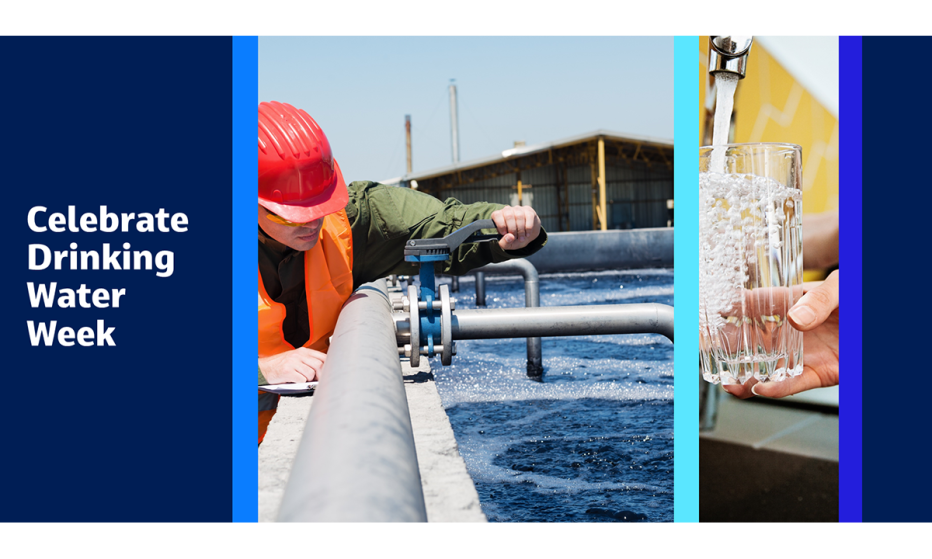
As we celebrate Drinking Water Week, May 3 – 9, 2020, Jacobs’ Vice President of Operations Management and Facilities Services Steve Meininger reflects on the critical role played by water operators.
Welcome to Drinking Water Week!
This year’s DWW theme – There when you need it – is especially fitting. Clean water is always important, and now, as we continue addressing a global pandemic, the role of a safe, reliable water supply to support public health and sanitation cannot be overstated.
Local governments and regulated utilities must deliver water to residents and businesses, and many water suppliers face challenges in addition to, or resulting from, managing COVID-19 response. Revenue reductions, strained budgets, aging equipment, growing demand, workforce shortages and tightening regulations can hinder consistent water service. In response to these issues, communities across the U.S., serving more than 37 million people, have opted to contract out their water utility operations.
As an industry-leading contract operator, Jacobs brings our client-partners outsourced operations and advisory services that help them make the most of their water treatment facilities, distribution systems and related infrastructure. Our services afford communities a number of benefits to help move them forward. Benefits include:
Risk transfer. Local governments must deliver a multitude of services in all conditions. They often employ large staffs at considerable financial exposure for payroll, benefits, training and supplies. Outsourcing water utility operations transfers most or all risk to the operator. The client retains ownership and overall decision-making authority for its assets, but can focus on other administrative and planning priorities, and benefit from the operator’s knowledge, business systems, economies of scale and network of resources for managing and improving facilities.
Access to technology. We apply data-tools such as computerized maintenance management systems that enable more accurate tracking and scheduling of maintenance and help project teams focus on predictive and condition-based preventive maintenance, rather than corrective maintenance. Managing and refocusing maintenance practices helps prolong the useful life of key equipment, reducing operating costs and avoiding unnecessary expense.
Remote sensors and mobile technologies for monitoring equipment and managing tasks enable operators to prioritize their efforts and make better decisions, allowing more time to focus on the task or tasks needing the most attention.
Career growth for staff members. Good contract operations firms invest in the training and advancement of their people. Staff members who prepare for and obtain advanced certifications tend to manage facilities more effectively, avoiding unnecessary expenses and generating ideas for more cost-efficient operations. Staff members who make the effort to advance can expand their responsibilities and take advantage of career and leadership opportunities across many facilities.
Strong safety performance. Safety is the foundation of our services. Keeping our people working safely means we look closely at the plants and equipment within our responsibility, and make changes to operating protocol, and at times to the equipment itself, to assure our operators can do their jobs safely. A singular focus on safety results in stories like that of our team at The Dalles, Oregon, which just marked 20 years without a lost-time injury.
Emergency response. The necessity for social distancing and the reduction in travel has prompted even more innovative approaches for supporting our teams and our clients. We’ve begun using wearable technology in certain situations that enables our technical staff to communicate remotely with operators and technicians on our worksites—guiding and advising them while they perform complex maintenance actions or repairs on equipment and control systems.
Jacobs developed site-specific continuity of operations plans to assist our local-government partners. We placed 75 operations specialists and technical advisors on call to advise operators, or travel to affected facilities and lend operations support. We’ve developed and implemented operations continuity plans matched to the needs and objectives at each facility in our care.
Advancing the water industry through community involvement. Jacobs’ ongoing support of Water For People has brought improvements to sanitation and water supply to people around the world who need it most. Jacobs is a foundational sponsor of Water for People’s Destination 2030 initiative – a 10-year visionary endeavor to help countries achieve the United Nations’ Sustainable Development goal of clean water and sanitation. New York Times columnist Nicholas Kristof launched the C-19 Impact Initiative to highlight organizations like Water For People working to advance public health in the face of the COVID-19 pandemic.
The commitment and professionalism of our Jacobs O&M team, in these extraordinary circumstances and always, surely has contributed to our contract-operation industry’s positive momentum and growth over the past five years. Industry analysis published by the National Association of Water Companies, with data collected by industry analyst Mazars, indicates overall contract operations market growth as measured by population served is up by 5% in the last year measured. Global Water Intelligence’s April issue includes a water utility operations survey that points to continued opportunities for contract operators. GWI cites nimble partnerships and risk sharing as principal elements for continued success in the new normal of COVID-19.
As Jacobs’ Global Vice President of Operations Management and Facilities Services, Steve Meininger’s message to his team is to never forget the essential role they play in protecting and enhancing our critical infrastructure. These quiet everyday heroes are sustaining continuity of services throughout hurricanes, natural disasters and health pandemics like COVID-19 with selfless sacrifices; while reinventing the way we work and pushing the limits on new technologies and approaches. Meet Steve.
Jacobs water O&M by the numbers
Total water-treatment capacity, all water plants – 597 million gallons per day
Largest water facility operated – 180 mgd
Length of water distribution systems operated – 3,690 miles
Contract renewal/client retention rate, past 5 years – 99 percent
Longest water facility O&M partnership – 36 years














































